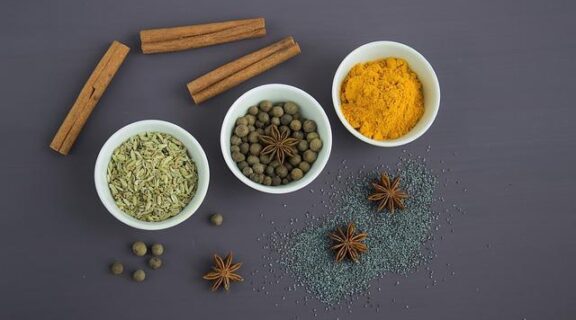By Jordan Haworth, GI Physiologist
Eating a variety of spices has been shown to promote beneficial bacteria in the gut, which is a sign of gut health.
Spices come from the non-leafy parts of plants, such as the bark, roots, and seeds. They have been used in cooking for thousands of years, particularly in Africa and Asia. Spices eventually made their way into Europe, where they were traded for other goods. In fact, spices were regularly used in place of money, and, at one point, cinnamon was worth its weight in gold.
The prized properties of spices go beyond flavouring food, as many have been used historically as medicine. For example, traditional Chinese medicine used ginger to treat fatigue whereas Ayurvedic medicine used it to improve digestion. They were not wrong either, as ginger has been shown to be helpful for nausea and vomiting(1).
Polyphenols are powerful compounds found in plants, and they are highly concentrated in spices. Curcumin is a polyphenol found in turmeric that is revered for its anti-inflammatory properties, and could potentially be helpful for some gastrointestinal disorders, such as irritable bowel syndrome (IBS) and inflammatory bowel disease (IBD)(2).
The gut health benefits of spices and their polyphenols may be related to a positive change in gut microbes, collective known as the gut microbiota. A recent study looked at the effects of consuming a mixture of spices including turmeric, cumin, coriander, amla (Indian gooseberry), cinnamon, clove, and cayenne pepper. Those consuming 6g per day, roughly two teaspoons, had an increase in beneficial Bifidobacteria(3).
Another study found that people who added 6g of spices per day to their standard American style diet saw an increase in butyrate-producing bacteria in their gut. Butyrate is a short-chain fatty acid that reduces inflammation and provides fuel for intestinal cells(4). This means that spices act as prebiotics by promoting the growth of beneficial species in our gut.
Whether it’s curry, stir fry, soups, or stews, incorporating spices into your meals can be a simple and tasty way to support gut health.
References
- Nikkhah Bodagh M, Maleki I, Hekmatdoost A. Ginger in gastrointestinal disorders: A systematic review of clinical trials. Food Sci Nutr. 2018;7(1):96-108. Published 2018 Nov 5. doi:10.1002/fsn3.807
- Atefi M, Darand M, Entezari MH, Jamialahmadi T, Bagherniya M, Sahebkar A. A Systematic Review of the Clinical Use of Curcumin for the Management of Gastrointestinal Diseases. Adv Exp Med Biol. 2021;1291:295-326. doi: 10.1007/978-3-030-56153-6_18.
- Khine WWT, Haldar S, De Loi S, Lee YK. A single serving of mixed spices alters gut microflora composition: a dose-response randomised trial. Sci Rep. 2021 May 28;11(1):11264. doi: 10.1038/s41598-021-90453-7
- Petersen K, Kris-Etherton P, Anderson S, et al. Herbs and Spices Modulate Gut Microbiota Composition: A Randomized, Crossover, Controlled-Feeding Study. Curr Dev Nutr. 2021;5(Suppl 2):360. Published 2021 Jun 7. doi:10.1093/cdn/nzab037_070

